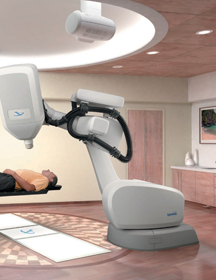
ThedaCare redesigned its processes before adopting radiosurgery and installing a Cyberknife System by Accuray.
Policy makers talk about improving the healthcare system by cutting costs. But all too often, as we have seen recently with the Deficit Reduction Act of 2005, this approach comprises patient access to care. However, cutting costs and improving quality do not have to be mutually exclusive.
A more effective strategy is to look at how patient care can be improved without increasing spending. Sound too good to be true? For the radiation oncology department at ThedaCare, a Wisconsin-based health network, it became a reality. After implementing ‘lean management’ techniques, the department in one year alone, improved productivity by 30 percent, increased gross revenue by 24 percent and reduced the time from patient referral to treatment by 44 percent.
Physician Buy-In
With the guidance of Simpler Healthcare, a consulting group, ThedaCare adopted lean management principles — a methodology, originally developed at Toyota in its Toyota Product System, which trains employees to identify and eliminate waste, thus improving patient care and cutting cost.
Thedacare set out to implement lean management first by getting the hospital staff to identify the value stream of the department. This involved analyzing the whole care cycle, from check in at reception, to receiving treatment, to getting test results; each step in the patient’s experience was evaluated to determine if it added value to the process.
“Then we looked at the steps that do not produce value – waiting, misdiagnosis, motion transportation – anything that falls under the category of waste. Then we focused on the nonvalue add – in this case the things the patients have to do, but doesn’t provide better care,” said Simpler Healthcare’s General Manager Mike Chamberlain.
What is key to the success of implementing lean management in healthcare is physician buy-in. One of the breakthrough improvement events was aimed at helping physicians understand their capacity as far as their schedule is concerned. To help overburdened physicians, the radiation oncology department developed a team approach in which patients were able to receive more face time with hospital staff and physicians received the necessary support to keep on task with their schedule.
The Patient’s Take
To determine the value of their patients’ experiences, the department surveyed patients about their treatment. ThedaCare determined that patients found the most value in the face-to-face interactions with hospital staff. The radiation oncology department quickly went to work, and started a series of rapid improvement events that would help physicians, nurses and staff eliminate the waste in their daily tasks and allow patients more face-to-face interactions.
Prepping for New Technology
Thedacare applied lean management practices before installing a Cyberknife radiosurgery system, which represented technology that was new to the facility. To do this, they focused on one thing — the patient and eliminating waste.
“Rather than hiring two radiation therapists, another physicist, another dosimetrist, we looked at ways to reduce waste in other processes that would create the capacity to take on this new technology without additional cost,” said Kim Barnas, vice president of the radiation oncology department. “Where we thought we were going to have to hire four FTEs we were able to only hire two.”
Reduced Treatment Times
Another strategy for eliminating waste was to reduce treatment time.
“We had a goal of reducing our treatment time, which three years ago was 23 days from first consult to first treatment, by 50 percent each year. In doing that you have to look at all of the components of the process,” said Barnas.
“The initial phase begins when a patient comes in for a consult - we do the sim, then the MRI. The dosimetrists get their first plan to the physician and changes are made, and we schedule the first treatment,” said Barnas. “By reducing the time from three days to one day, we improved quality.”
The process today is much more streamlined. As Barnas explained, “Now if there needs to be an MRI, we schedule that too. After the sims and the MRI, we have the physician huddle with the radiation therapist, the dosimetrist and the physicist to look at the scans to make sure they are accurate before the patient leaves so that we don’t have to redo the simulation or the MRI. This allows us to get the patient more quickly to treatment, improve quality and reduce costs because there are no duplications or replanning.”
Today, ThedaCare has reduced the process to eight days, and the procedure volume has increased.
“Our procedures are up 40 percent,” noted Barnas. “In addition to lean management, we are discovering that some of the patients previously treated on the Varian or TomoTherapy can get boosted by Cyberknife. Although our volume is up, our treatment is up at a much more significant rate.”
Once the lean management strategy was in full swing at ThedaCare, the physicians saw improvements from a quality care perspective, the administration saw the cost reduction benefit and fortunately the patients have been able to see the greatest benefits.


 January 30, 2026
January 30, 2026 









